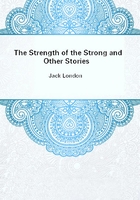
第21章 THE ENEMY OF ALL THE WORLD.(2)
He was a remarkable student. Application such as his would have taken him far; but he did not need application. A glance at a text meant mastery for him. The result was that he did an immense amount of collateral reading and acquired more in half a year than did the average student in half-a-dozen years. In 1909, barely fourteen years of age, he was ready - "more than ready" the headmaster of the academy said - to enter Yale or Harvard. His juvenility prevented him from entering those universities, and so, in 1909, we find him a freshman at historic Bowdoin College. In 1913 he graduated with highest honours, and immediately afterward followed Professor Bradlough to Berkeley, California. The one friend that Emil Gluck discovered in all his life was Professor Bradlough. The latter's weak lungs had led him to exchange Maine for California, the removal being facilitated by the offer of a professorship in the State University. Throughout the year 1914, Emil Gluck resided in Berkeley and took special scientific courses.
Toward the end of that year two deaths changed his prospects and his relations with life. The death of Professor Bradlough took from him the one friend he was ever to know, and the death of Ann Bartell left him penniless. Hating the unfortunate lad to the last, she cut him off with one hundred dollars.
The following year, at twenty years of age, Emil Gluck was enrolled as an instructor of chemistry in the University of California.
Here the years passed quietly; he faithfully performed the drudgery that brought him his salary, and, a student always, he took half-a- dozen degrees. He was, among other things, a Doctor of Sociology, of Philosophy, and of Science, though he was known to the world, in later days, only as Professor Gluck.
He was twenty-seven years old when he first sprang into prominence in the newspapers through the publication of his book, SEX AND PROGRESS. The book remains to-day a milestone in the history and philosophy of marriage. It is a heavy tome of over seven hundred pages, painfully careful and accurate, and startlingly original.
It was a book for scientists, and not one calculated to make a stir. But Gluck, in the last chapter, using barely three lines for it, mentioned the hypothetical desirability of trial marriages. At once the newspapers seized these three lines, "played them up yellow," as the slang was in those days, and set the whole world laughing at Emil Gluck, the bespectacled young professor of twenty- seven. Photographers snapped him, he was besieged by reporters, women's clubs throughout the land passed resolutions condemning him and his immoral theories; and on the floor of the California Assembly, while discussing the state appropriation to the University, a motion demanding the expulsion of Gluck was made under threat of withholding the appropriation - of course, none of his persecutors had read the book; the twisted newspaper version of only three lines of it was enough for them. Here began Emil Gluck's hatred for newspaper men. By them his serious and intrinsically valuable work of six years had been made a laughing- stock and a notoriety. To his dying day, and to their everlasting regret, he never forgave them.
It was the newspapers that were responsible for the next disaster that befell him. For the five years following the publication of his book he had remained silent, and silence for a lonely man is not good. One can conjecture sympathetically the awful solitude of Emil Gluck in that populous University; for he was without friends and without sympathy. His only recourse was books, and he went on reading and studying enormously. But in 1927 he accepted an invitation to appear before the Human Interest Society of Emeryville. He did not trust himself to speak, and as we write we have before us a copy of his learned paper. It is sober, scholarly, and scientific, and, it must also be added, conservative. But in one place he dealt with, and I quote his words, "the industrial and social revolution that is taking place in society." A reporter present seized upon the word "revolution," divorced it from the text, and wrote a garbled account that made Emil Gluck appear an anarchist. At once, "Professor Gluck, anarchist," flamed over the wires and was appropriately "featured" in all the newspapers in the land.
He had attempted to reply to the previous newspaper attack, but now he remained silent. Bitterness had already corroded his soul. The University faculty appealed to him to defend himself, but he sullenly declined, even refusing to enter in defence a copy of his paper to save himself from expulsion. He refused to resign, and was discharged from the University faculty. It must be added that political pressure had been put upon the University Regents and the President.